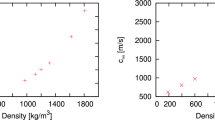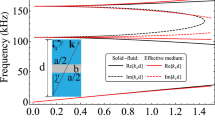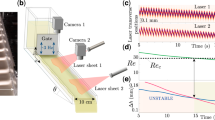Abstract
THE underlying assumption implicit in work concerned with the propagation of stress waves in liquids is that any pressure disturbance originating at some point in the liquid travels unchanged in form with a velocity c = √(dp/dρ), which is independent of the density. Such a wave is an ‘acoustic’ wave, and it is well known that this assumption is amply justified for the small variations of density and pressure usually developed by sound sources under water. But is it justified when the pressure at a point in a liquid rises suddenly by 200 atmospheres (say) due to the passage of a transient stress pulse ? The purpose of this communication is to consider this question on the basis of the type of conditions prevailing in previous experiments described by me and other workers1–3.
This is a preview of subscription content, access via your institution
Access options
Subscribe to this journal
Receive 51 print issues and online access
$199.00 per year
only $3.90 per issue
Buy this article
- Purchase on Springer Link
- Instant access to full article PDF
Prices may be subject to local taxes which are calculated during checkout
Similar content being viewed by others
References
Rees, E. P., and Trevena, D. H., Brit. J. App. Phys., 15, 759 (1964).
Trevena, D. H., Nature, 203, 1158 (1964).
Bull, T. H., Brit. J. App. Phys., 7, 416 (1956).
Author information
Authors and Affiliations
Rights and permissions
About this article
Cite this article
TREVENA, D. Propagation of Stress Waves in Liquids. Nature 204, 768–769 (1964). https://doi.org/10.1038/204768b0
Issue Date:
DOI: https://doi.org/10.1038/204768b0
Comments
By submitting a comment you agree to abide by our Terms and Community Guidelines. If you find something abusive or that does not comply with our terms or guidelines please flag it as inappropriate.



